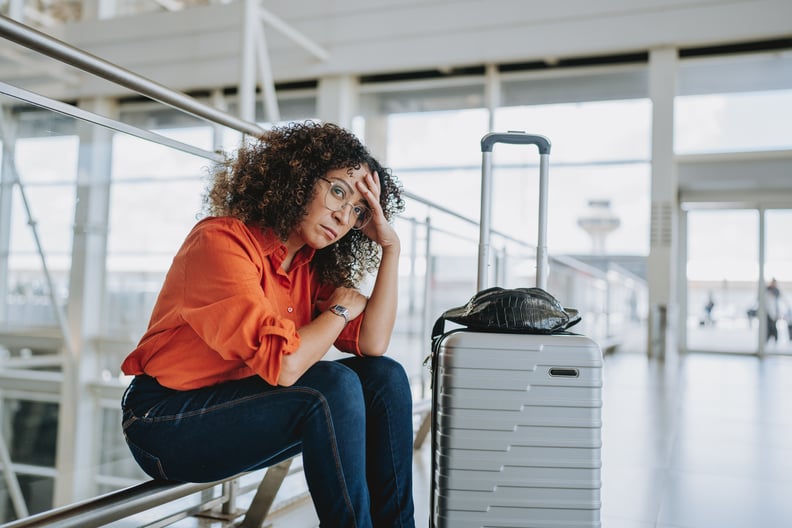It’s Not In Your Head: Traveling Can Make You More Constipated

Travel is stressful enough as it is. But when your vacation starts to mess with your body’s regular functioning, it can be downright anxiety-inducing. If you tend to feel constipated when you’re traveling, you’re not alone. But why does it happen? It has a lot to do with your change in routine (more on that later!).
Thankfully, if you’re dealing with constipation while traveling, there are ways to help. No one wants to go about their trip in discomfort, so we spoke to a gastroenterologist about why travel constipation happens. Plus, she shared her best advice for preventing constipation while away from home. Read on to see the top tips to help your digestive system get back on track.
Experts Featured in This Article:
Samantha Nazareth, MD, is a gastroenterologist and chief medical officer of metaMe.
Why Does Traveling Make You Constipated?
The change in routine has a lot to do with why you’re backed up. Flight delays, long periods of sitting, and potentially limited amounts of fluids all help create the perfect storm for your digestive system, sometimes resulting in painful constipation, discomfort, and bloating.
Lack of motion, in particular, is a key factor. “Most people are traveling for hours on end, and not really moving a whole lot,” says gastroenterologist Samantha Nazareth, MD. Even when you get to your destination, you may not be moving a whole lot either as holidays tend to revolve around the dinner table. “As soon as we sit and don’t move, that slows down the movements inside of us called peristalsis.” Peristalsis involves wave-like muscle contractions responsible for moving food from the esophagus to the stomach and intestines, eventually making it so that you have to go number two.
How to Prevent Constipation While Traveling
Constipation is typically defined as three or fewer bowel movements a week, and stool that’s difficult or uncomfortable to pass, per the Mayo Clinic. As a note, while constipation can typically be treated at home, if your symptoms persist, make sure to contact your doctor for the best personalized medical advice. To avoid constipation while traveling in the first place, Dr. Nazareth recommends the following.
- Pack Snacks: “I usually tell people to bring their own snacks,” Dr. Nazareth says. Instead of munching on the cookies the flight attendant hands out, Dr. Nazareth recommends snacking on whole foods like fruit. There are also specific foods that can help with constipation, including almonds and kiwis, both of which are high in fiber for smoother digestion.
- Stay Hydrated: Another way to prevent bloating and constipation is to stay hydrated. According to the Cleveland Clinic, dehydration slows down the movement of waste in your GI tract, making it a common culprit of constipation while traveling. Changes in altitude, climate, and activity can also contribute to dehydration, all of which may be more common during travel. With this in mind, Dr. Nazareth recommends traveling with a reusable water bottle to prevent becoming dehydrated and to keep your digestive system happy. Electrolyte powders and beverages can also help prevent dehydration, especially if you’re traveling in warmer weather.
- Stay Active: Whether you’re traveling for work or for leisure, Dr. Nazareth says it’s important to stay active while traveling and once you reach your destination. You don’t have to do an intense workout, but you should aim to move around as much as possible to help regulate your digestion and avoid constipation. Even a quick walk around the airport or a few stretch breaks can keep things moving and prevent waste from getting stuck.
- Get Outside: Research suggests that your circadian rhythm (internal clock) may also be linked to constipation and irritable bowel syndrome. If your schedule is off, or you’re traveling somewhere with a significant time change, Dr. Nazareth recommends going outside in the sunlight so you can reset your digestion’s circadian rhythm. “The sooner you get back to normal daylight and your body recognizes the sunlight is now out at a different time, the sooner things will get back to normal,” she says.
— Additional reporting by Chandler Plante
Tamara Pridgett was an associate editor with PS Fitness. She’s a NASM-certified personal trainer and Precision Nutrition level 1 coach, and was a Division 1 All-American sprinter.
Chandler Plante (she/her) is an assistant health and fitness editor for PS. She has over four years of professional journalism experience, previously working as an editorial assistant for People magazine and contributing to Ladygunn, Millie, and Bustle Digital Group.



